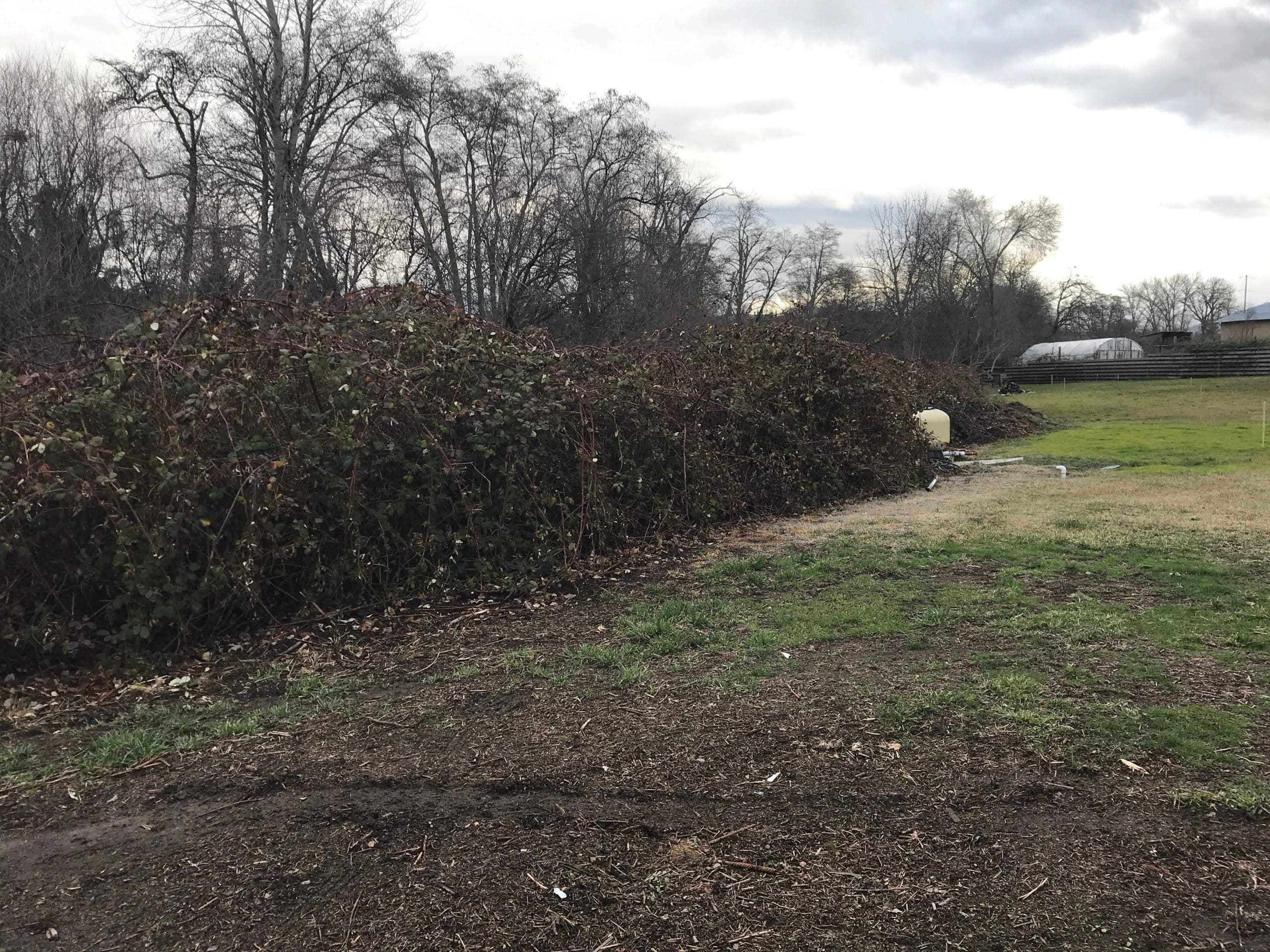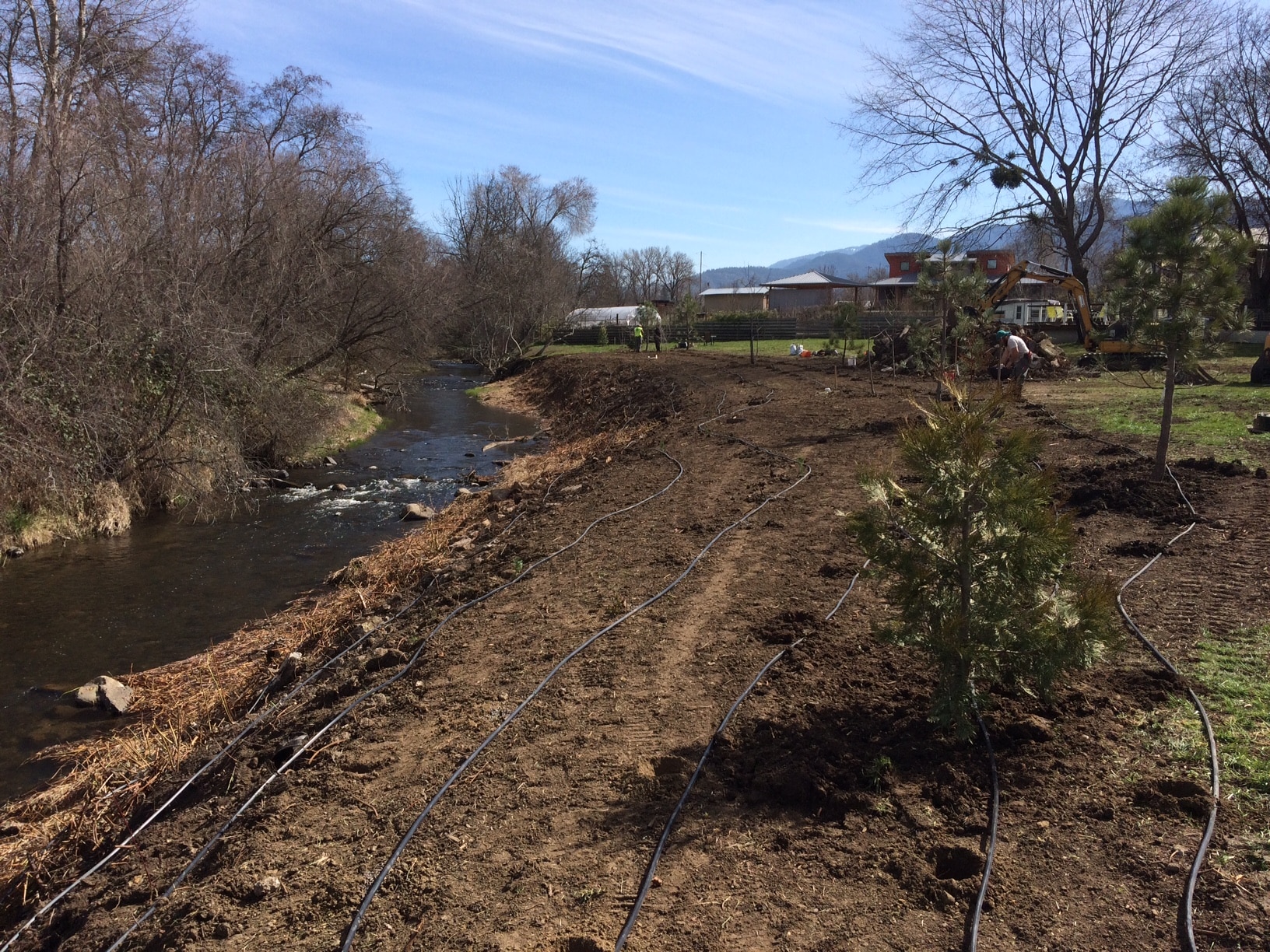Breaking ground inside Ashland city limits
In March, The Freshwater Trust (TFT) broke ground on a new restoration project along Bear Creek, a tributary of the Rogue River running through Ashland, Oregon.
Over the course of a few weeks, a bank, once wild and thick with invasive species, was treated, cleared and replanted with an array of native trees and shrubs. More than 600 Red Stem Dogwood, Douglas Spirea, Ninebark, and Red Flowering Currant were tucked into new soil. As the plants mature, they will provide shade for native fish and a colorful landscape for the landowner and his family.

Before: the banks of the creek were thick with invasive species.
This is the first of several projects to be implemented as part of a partnership with The City of Ashland. In 2018, the city contracted with TFT to restore more than 20 acres of streamside vegetation and to keep the water cool for native fish in southern Oregon’s Rogue River basin.
The partnership is known as “Water Quality Trading,” where municipalities use natural infrastructure techniques, such as streamside plantings or the building of wetlands, to offset the water quality impacts of treating and discharging wastewater on native fish. This is done with the goal of staying in compliance with the Clean Water Act (CWA).
Under the CWA, any point source, such as a wastewater treatment plant, that discharges to a waterway must operate within the bounds of a permit intended to protect the quality of the water. In the case of temperature, limits are designed to ensure discharges do not harm salmon and steelhead. Streamside plantings block solar load and bring the temperature of the water to a place that’s more hospitable for native fish.

After: the banks were treated, cleared and replanted with an array of more than 600 Red Stem Dogwood, Douglas Spirea, Ninebark, and Red Flowering Currant.
The contract with Ashland is the second TFT-led water quality trading program in the Rogue basin. In 2012, TFT partnered with the City of Medford to implement a first of its kind, nationally recognized program.
To ensure warm water discharged by Medford’s wastewater treatment plant won’t harm native fish when water levels are low and air temperature is high, TFT and its local partners have planted nearly 5 miles of native vegetation on the Rogue River and its tributaries to date. At the program’s completion, TFT will have planted enough trees to prevent 600 million kilocalories per day of solar load from entering the Rogue basin.
“We’ve been fortunate to have innovative, trusting partners here in southern Oregon that allow us to showcase how natural infrastructure projects help municipalities meet their compliance obligations and save money,” said Eugene Wier, TFT Restoration Project Manager. “There are many ancillary benefits to working with nature in this way.”
Natural infrastructure solutions often come at a fraction of the cost of alternative means of meeting compliance obligations.
The Ashland trading program will be approximately a quarter of the size of Medford’s and benefit Bear Creek, the most urbanized stream in southwest Oregon, once deemed among the most polluted in the state. After establishing guidelines for water quality, years of planting projects, and public education, the health of the creek rebounded and became a viable habitat for native fish species again.
“At the project site right now, you can see steelhead spawning,” said Wier. “It’s amazing how resilient these creatures are. This is proof that they can survive in dense, urban areas, as long as we take care of the quality of their habitat.”
TFT has implemented other restoration projects on the creek in partnership with the Bureau of Reclamation (BOR).
“Our history here goes back six years or so,” said Wier. “We’ve constructed numerous large wood structures along the creek to provide refuge.”
The restoration performed as part of this program will become TFT’s most urbanized restoration projects. The proposed projects will be in private backyards, in public parks and on city property.
“This is the first project where we are trying to create benefits while balancing the needs of an urban landowner,” said Wier. “That’s opened doors to collaborate with landscape designers to ensure the projects are aesthetically pleasing as well as ecologically beneficial. It will also allow more of the public to physically see the impacts of these partnerships.”
Two Oaks Studio, a landscape architecture firm in Ashland, worked with TFT to design this first project. Longtime partners Plant Oregon, a local nursery, raised and will help steward the plants.
“Any restoration project we implement supports a lot of local labor,” said Weir. “Now more than ever, we are fortunate that the contracts we sign support the local economy and small businesses down here. The benefits of river restoration are felt by far more than just the fish.”
A 2015 study shows that “ecological restoration is a $9.5 billion industry, employing about 126,000 people directly” in the United States. Additionally, the restoration economy indirectly generates $15 billion and 95,000 jobs, bringing restoration’s total economic output value to nearly $25 billion.
Published research shows that between 16 and 23 local jobs are supported in Oregon for every $1 million spent on restoration. Streamside restoration projects – such as those implemented by TFT, which tend to involve labor-intensive planting and fencing – supported the most jobs and wages. In addition to jobs, this money has a multiplier effect. Every dollar spent in Oregon for restoration results in an additional 1.7 to 2.6 times the amount of economic output.
This first project will be monitored by TFT for 20 years to ensure it stays healthy and is having the intended, quantified outcomes.
TFT will start on its second Ashland project in late May or early June.
“This project is a stone’s throw from TFT’s office, and it’s in the town I call home,” said Wier. “I’m looking forward to working directly with my neighbors and showing more of them what we do and why it’s critical.”
Restoration in the time of COVID-19
TFT and its subcontractors are closely tracking all federal, state, and local laws and orders pertaining to the protection of human health and safety during the COVID-19 outbreak. With respect to Oregon restoration projects, because of the outdoor, dispersed nature of our work, neither The Freshwater Trust nor its local restoration partners fall into a category of businesses shut down by Oregon’s recent executive order. Our subcontractors are a vital aspect of the outdoor and watershed health restoration economies across the state, and we will continue to implement on-the-ground projects for as long as permitted. While doing so, all employees and partners are complying with social distancing practices and guidelines to ensure the health and wellbeing of all involved. The rest of TFT’s work is capable of being done remotely. Non-field staff in Oregon, Idaho and California are working remotely, and our offices will remain closed for the foreseeable future.
March 26, 2020#Ashland #Bear Creek #Clean Water Act #planting trees #water quality #water quality trading
Enjoying Streamside?
This is a space of insight and commentary on how people, business, data and technology shape and impact the world of water. Subscribe and stay up-to-date.
Subscribe- Year in Review: 2023 Highlights
By Ben Wyatt - Report: Leveraging Analytics & Funding for Restoration
By Joe Whitworth - Report: Transparency & Transformational Change
By Joe Whitworth - On-the-Ground Action – Made Possible By You
By Haley Walker - A Report Representing Momentum
By Joe Whitworth

